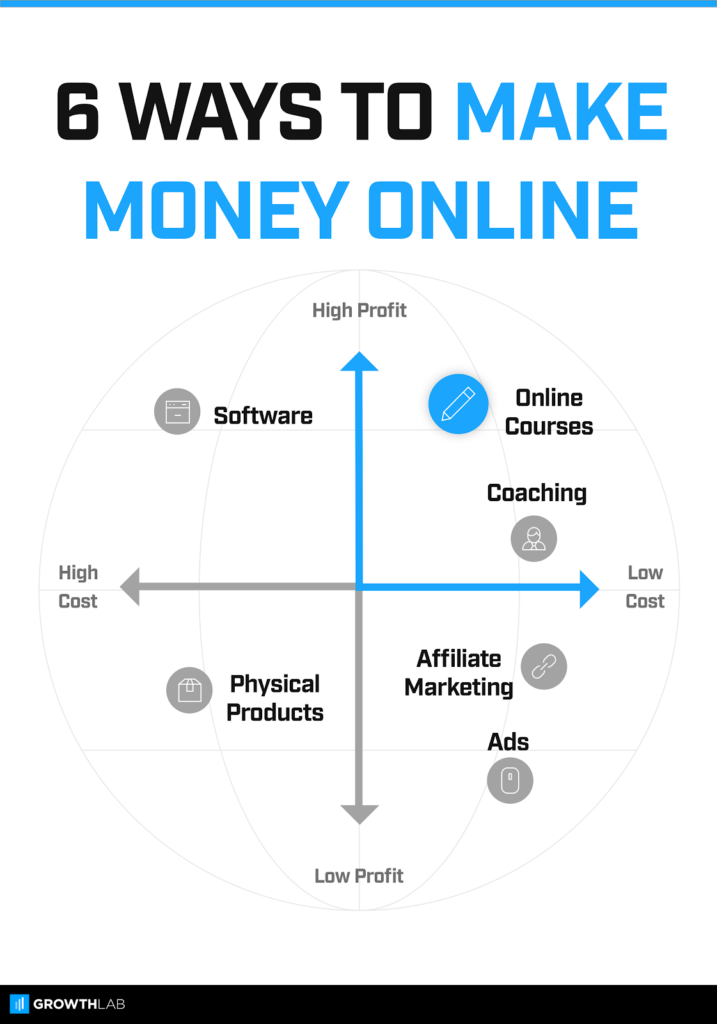
4 low cost business ideas with HUGE profit potential
In college, I never wanted to start my own business. The idea of investing thousands of dollars into a product or service without any guarantee of a return on my investment was off-putting, to say the least. Within a year of graduating, however, I realized that not all business opportunities require a huge influx of upfront cash, and my search for low cost business ideas with huge profit potential began. Eventually, I started a freelance writing business in 2013 and earned close to $200,000 in year one.
The lowest-cost businesses — those you can start some with as little as $100 — are the ones you can start with nothing but a laptop, an internet connection, and a deep understanding of your audience.
In general, these fall into four categories:
- Freelancing
- Coaching
- E-books
- Online courses
Because these business types are so general, it allows you to customize yours based on your passion, abilities, and time. Keep reading to learn why these low-cost business ideas are great, and how to pick the right one for you.
4 types of low cost business ideas with high profit
As you’re considering which type of business is best for you, I’d like to provide a few ideas that can help you focus on opportunities that are inexpensive to start but can provide big profits in the long run.
1. Freelancing
As long as you’re comfortable exchanging your time for money, freelancing is one of the lowest-cost business ideas out there. It’s also becoming more popular.
According to a study by the Freelancer’s Union and freelance platform Upwork, 57.3 million people freelanced in 2017. They expect freelancers to make up the majority of the U.S. workforce by 2027.
Whether you’re a writer, graphic designer, PR pro, or anything else that you can market, you can provide your service as a freelancer with very few expenses.
For example, you may need to fork over some cash for essential tools, such as invoicing software or a website for your portfolio. But for the most part, your labor is your product, making the monetary cost to stay in business are extremely low.
2. Coaching
As with freelancing, your time is your product. You may need to gather some tools to support your sessions with clients, such as good video conference software for out-of-state clients or data collection software to get as much information from them as you can before meeting. But if you do it right, you can get those relatively cheaply.
The best thing about coaching is that you can tailor your business based on what you’re passionate about and good at. If you’re a personal finance guru, for example, you can help people get their acts together with their money. Or if you’re particularly good at managing your time, you can be a productivity coach.
Again, as long as you’re good at it and there are people who aren’t, there’s a market for you to coach. And the more experienced you are in your particular field, the easier it will be to gain clients and charge what you’re worth.
3. E-books
If coaching isn’t your cup of tea, but you still want to share your expertise, writing e-books is another option. Your e-book can be about helping people develop better eating or exercise habits, how to write fiction, or whatever else you’re good at. Again, the sky’s the limit.
Generally, the only cost you’ll incur is the time it takes you to create and sell your e-book. If you want, you can shell out for fancy graphic design, but it’s not required to provide a great product.
4. Online courses
As with e-books, your primary expense with online courses is the time it takes you to create the material. There are some additional tools you can pay for, such as recording and editing software or video equipment for higher production value.
But none of these things are required. In fact, you can create an incredible and profitable online course with a PowerPoint presentation and an inexpensive screen recording software like Camtasia.
As for the content, there are courses out there for everything under the sun. I did some poking around and found courses on how to learn to code, how to be funny, and even how to solve a Rubik’s Cube. Figure out what you’re good at, and there’s probably a market for it.
If you’re considering doing an online course, run a search for your specialty on online course sites like Teachable and Udemy. There, you’ll get an idea of what’s already out there and how you can create something better.
[yellowbox] Bonus: Want to work from home, control your schedule, and make more money? Download my FREE Ultimate Guide to Working from Home[/yellowbox]
Why it’s important to keep costs low when looking for low cost business ideas
Your dream of starting a business may never happen if it requires a big investment. And if it does, there’s no guarantee it’ll be on your terms. Here’s why starting with low-cost business ideas is best.
It lowers the barrier to entry
For most people, it’s not hard to scrape together $100 to start a business. Even if you’re living paycheck to paycheck, it may just require that you find some ways to earn a little extra cash or re-prioritize where your money goes.
And if you already have a laptop and an internet connection, you don’t even need the money yet to start planning what you want to do.
When I first started freelance writing, I was making $9.75 an hour as a bank teller. My only cash outlay for the first year was the cost of a domain name and hosting for my website, and I managed to set everything up in one day.
No business loans or venture capital money required with low cost business ideas
It’s tough to get approved for a business loan when you’re just starting out, and even if you do, you can expect to pay double-digit interest rates whether or not your business survives.
To get an investment from a venture capitalist, you’d likely need to give up equity and a measure of control in your business.
But when your initial investment is as little as $100, you don’t even need to think about these options and the disadvantages that come with them.
https://www.instagram.com/p/Bn4OcB-FY-m/
Financial stability
The narrative of putting your life savings into a new business idea with no guarantees is charming, but it’s also terrifying to most people without that kind of entrepreneurial spirit.
With these low-cost business ideas, though, anyone can start something without wondering if they’ll be able to feed their family or pay their rent. Since I started my own freelance writing business in 2013, I’ve moved several times, changed jobs, and had two kids. Throughout all of it, I’ve never had to wonder if my business is putting my family’s financial well-being in jeopardy.
Potential for good profit margins in low cost business ideas
Up until recently, the revenue from my business was essentially my income. But even now that I rent office space, have an accountant on retainer, and travel to attend conferences every year, my profit margins are still insanely high.
That’s because freelancing and other low-cost business ideas don’t require a lot of expenses to keep them going after you’ve started, giving you more flexibility than ever once the money starts pouring in.
Why low costs aren’t enough
There are countless low-cost business ideas out there, but many aren’t worth pursuing because there’s little upside. For example, answering online surveys to earn a little extra cash doesn’t require any startup costs, but there’s no way you’re going to earn enough money to make it worth your time.
So it’s essential to focus on low-cost business ideas with high-profit opportunities. Here’s a simple grid that can give you an idea of where to focus your research.
Finding your low cost business idea
If you want to make money and enjoy what you do, it’s not enough to pursue just any business idea. You want the right low-cost business idea that people will pay you for.
So it’s not only important to understand what you’re good at but also to take the time to research your prospective customer base and validate that they’ll buy your product or service. It can be a frustrating process if you’re excited about getting started, but it’s essential to building a profitable business.
At GrowthLab, we’ve helped tons of students find low-cost business ideas doing things they already love. Part of the process includes Idea Mapping. This concept involves coming up with business ideas based on your skills, your knowledge, and the challenges you’ve overcome. These are unique to you, which means that other people will pay you to gain what you have.
Want to learn more about finding the right business idea?
Want to build a business that enables you to live YOUR Rich Life? Get my FREE guide on finding your first profitable idea.
Host of Netflix’s “How To Get Rich” NYT Bestselling Author, & Host of the I Will Teach You To Be Rich Podcast. I’ll show you how to take control of your money with my proven strategies so you can live your RICH LIFE.
Written by Ramit Sethi
Host of Netflix’s “How To Get Rich” NYT Bestselling Author, & Host of the I Will Teach You To Be Rich Podcast. I’ll show you how to take control of your money with my proven strategies so you can live your RICH LIFE.



